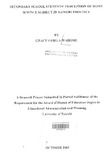| dc.description.abstract | Home science subject is a very vital area of study. Our day-to-day lives rotate around this subject, mainly being needlework, cookery, and housecraft. Unfortunately, it is not as popular as it should be, and particularly with the boy students.
To this end, specific objectives for this study were arrived at. Sufficient literature was reviewed that helped to concretize the problem under study. The literature developed into the history of home science in Kenya and abroad, the home science curriculum, and attitude of students towards home science based on previous researches.
This research was conducted using an ex-post -facto research design, which is used when data is being classified by major sub-groups of the population. A sample size of 156 respondents was used. Three types of sampling methods were used, for accurate findings from the sub-groups, which were used. These were, purposive sampling, probability sampling and simple random sampling.
Data was gathered through the use of the students' questionnaire. The instruments were pre-tested and their validity established as quite adequate. In addition, consultation and advise mainly from the supervisor was incorporated to increase the validity and reliability of the instruments before giving them to respondents.
The questionnaire return rate was 60%, which, according to central limit theorem is sufficient to enable us draw conclusions on the whole population. Tables, pie charts and graphs were employed in data analysis. After discussions of the findings of the study, recommendations were made as well as suggestions for further study.
The major finding of this study was that students were dissatisfied with the government policy to make home science subject an elective subject. In conclusion, since students still value the subject a lot, this study recommended that the government of Kenya should make home science subject a core subject. If not, the government should reduce the number of elective subjects that are grouped together with home science subject. | en_US |

